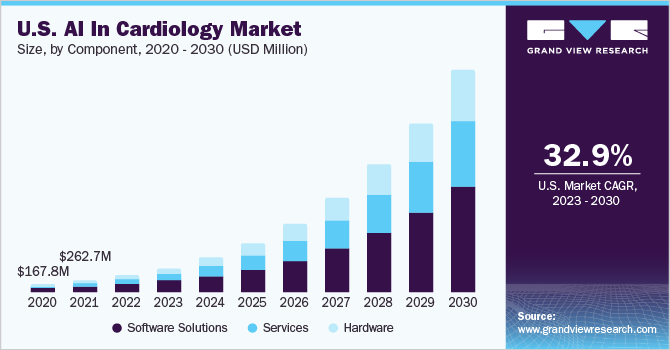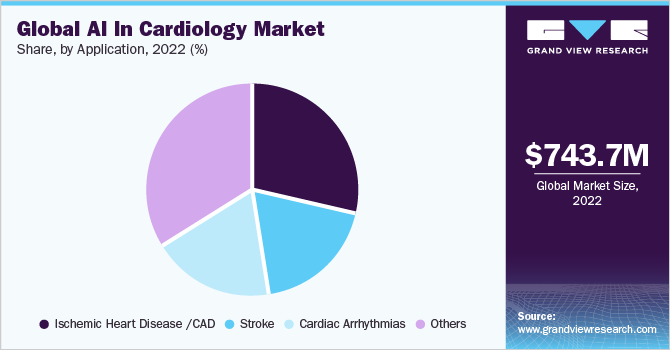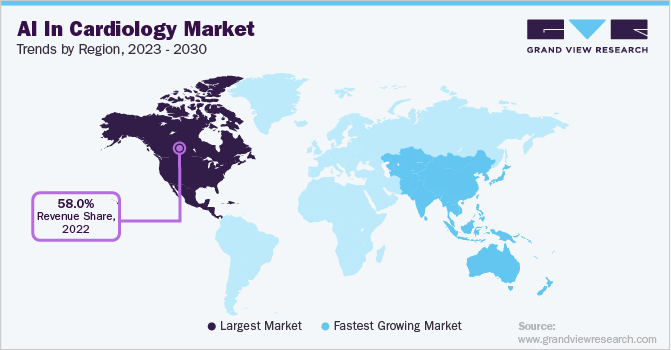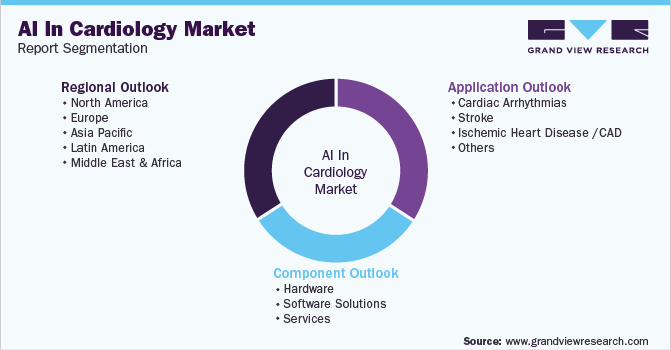
Artificial Intelligence In Cardiology Market Size, Share & Trends Analysis Report By Component (Hardware, Services), By Application (Stroke, CHD/CAD), By Region, And Segment Forecasts, 2023 - 2030
- Report ID: GVR-4-68040-047-1
- Number of Pages: 118
- Format: Electronic (PDF)
- Historical Range: 2018 - 2021
- Industry:Healthcare
Report Overview
The global artificial intelligence in cardiology market size was valued at USD 743.7 million in 2022 and is expected to expand at a compound annual growth rate (CAGR) of 34.1% from 2023 to 2030. The high burden of cardiovascular diseases worldwide, the growing emphasis of cardiac physicians on improving accuracy in diagnosing heart diseases, and technological advancement in cardiac imaging are some of the major factors supporting the growth of artificial intelligence (AI) in the cardiology industry. The COVID-19 pandemic has highlighted the need for Artificial intelligence in Cardiology and has accelerated its adoption in many healthcare systems. The impact has also increased the demand for AI solutions that can improve patient outcomes and support the effective management of patients with cardiovascular conditions.

For example, AI algorithms have been used to identify patients who are at high risk for severe illness from COVID-19 based on factors such as age, underlying health conditions, and vital signs. Additionally, AI has been used to support remote monitoring of patients with cardiovascular diseases, allowing for effective management and early intervention to prevent hospitalization. This was particularly important during the pandemic as it reduced the risk of exposure to the virus and helped conserve limited hospital resources. The COVID-19 pandemic has accelerated the adoption of Artificial intelligence in Cardiology, and its use is expected to increase in the future.
Artificial intelligenceis used to improve diagnosis, treatment planning, and patient outcomes. AI can be used for various applications including image analysis for disease detection and diagnosis, predictive analytics for risk assessment and early intervention, and personalized treatment planning based on patient-specific data. Furthermore, the technology is streamlining, automating administrative tasks, and enhancing clinical decision-making through real-time data analysis. The use of Artificial intelligence in cardiology is still in the early stages of development, but the potential benefits are significant and include improved accuracy, efficiency, and patient outcomes.
The future of cardiology will be highly based on various innovative digital technologies including artificial intelligence (AI), precision medicine, and theInternet of Things(物联网)。人工智能的潜力在未来心脏病demonstrated by the development of methods for the detection of malignant arrhythmias through wearables. It provides an accurate prediction of CVD outcomes, diagnosis, and treatment strategies. It also provides outcome prediction for heart failure (HF) patients and non-invasive diagnosis of coronary artery disease (CAD).
Component Insights
In 2022, the market was dominated by the software component, which held the highest revenue share of 43.7%, and the segment is predicted to grow with the fastest CAGR of 35.2%. This growth can be attributed to the rising demand for AI-enabled diagnostic solutions that provide a highly accurate diagnosis for cardiac patients. Moreover, this software increases productivity and provides better heart analysis. These factors are improving the demand for AI software in cardiology.
除此之外,基于ai软件增强了物理ian decision-making through data analysis. The ECG, guided by AI algorithms, is capable of detecting abnormalities and has also reduced the time for diagnosis. Moreover, a significant number ofsoftwarecompanies have adopted strategies such as funding, partnerships, and others to improve their overall position in the market. For instance, in July 2022, Clearly raised Series C funding of USD 192 million for developing AI-based software for diagnosing atherosclerosis. These factors are expected to improve the segment's market growth.
Application Insights
Based on application, others, followed by, coronary artery disease dominated the market with a share of 28.6% in 2022. Coronary artery disease is one of the most common types of heart disease and affects a significant number of people worldwide. According to the American Heart Association, in 2020, over 244.1 million people worldwide were suffering from coronary artery disease. The high number of people living with this disease is likely to improve the adoption of AI in diagnosing and treating coronary artery disease and thus support the segment market. AI systems help in decision-making by automating and standardizing the interpretation and thus improving the diagnostic accuracy in coronary artery disease. All the above-mentioned factors support the segment’s growth.

The arrhythmia segment is anticipated to witness the fastest growth of 37.5% over the forecast period from 2023 to 2030. The high accuracy of AI in detecting arrhythmias is one of the major factors supporting the segment’s growth. According to a recent study published by the National Center for Biotechnology Information (NCBI) in 2022, an AI algorithm classified arrhythmia with 95.4% accuracy. Furthermore, AI classified the disease with a specificity of 94.52%, positive predictive value of 89.74%, negative predictive value of 98.55%, and 97.19% sensitivity. The researchers of the study concluded that AI’s use would reduce the overall false-positive results by 98.0%.
This is expected to improve the adoption of AI in arrhythmia applications. Arrhythmia is caused by blocked arteries, stress, hypertension, sleep apnea, and other reasons. The high number of people suffering from these disorders is further expected to improve the demand for AI for the diagnosis and treatment of arrhythmias.
Regional Insights
North America held a share of 58.0% in the AI in Cardiology industry in 2022. This is due to various factors such as well-established healthcare infrastructure, rapid adoption of technologically advanced products, and increased regulatory approvals of AI products in the region.

For instance, in February 2023, DiA Imaging Analysis received U.S. FDA clearance for its LVivo IQS software solution, which is used to provide high-quality echocardiography images of the heart to physicians. Similar approvals in the region in the future are expected to improve the regional market growth.
The Asia Pacific region is expected to witness the fastest growth over the forecast period from 2023 to 2030, owing to various factors such as the growing geriatric population, developing healthcare infrastructure, and improvement in the region's economic conditions.
Moreover, there is a high prevalence of cardiovascular diseases in the region. For instance, according to the NCBI, in 2019, over 106 million CVD patients lived in China. The region's high disease burden and developing healthcare infrastructure are expected to improve the adoption of AI in cardiac diagnosis and treatment. All the above-mentioned factors are expected to support regional market growth.
Key Companies & Market Share Insights
几个关键球员市场的任务strategies such as partnerships, and acquisitions, applying for regulatory approval, and raising investments to maintain their market position. For instance, in July 2022, Anumana, joined forces with Novartis to develop its AI algorithms for detecting subclinical heart disease using electrocardiograms (ECGs). The partnership aims to advance and bring AI algorithms for ECGs to assist physicians in swiftly identifying and treating patients with previously undiscovered life-threatening heart conditions. Some prominent players in the global artificial intelligence in cardiology market include:
IDOVEN
CardiAI
Ultromics Limited.
Arterys Inc.
Cardiologs
Ultrasight
DiA Imaging Analysis
Vista AI
Viz ai
RSIP Vision
Cleerly, Inc.
Artificial Intelligence In Cardiology Market Report Scope
Report Attribute |
Details |
Market size value in 2023 |
USD 1.1 billion |
Revenue forecast in 2030 |
USD 11.5 billion |
Growth rate |
CAGR of 34.1% from 2023 to 2030 |
Base year for estimation |
2022 |
Historical data |
2018 - 2021 |
Forecast period |
2023 - 2030 |
Quantitative units |
Revenue in USD million, CAGR from 2023 to 2030 |
Report coverage |
Revenue forecast, company ranking, competitive landscape, growth factors, and trends |
Segments covered |
Component, application, region |
Regional scope |
北美;欧洲;亚太地区;拉丁美洲; MEA |
Country scope |
U.S.; Canada; U.K.; Germany; Spain; France; Italy; Russia; Switzerland; Denmark; Sweden; Norway; China; Japan; India; Australia; Thailand; South Korea; Mexico; Brazil; Argentina; South Africa; Saudi Arabia; UAE; Kuwait |
Key companies profiled |
IDOVEN; CardiAI; Ultromics Limited.; Arterys Inc.; Cardiologs; Ultrasight; DiA Imaging Analysis; Vista AI; Viz ai; RSIP Vision; Cleerly, Inc. |
Customization scope |
Free report customization (equivalent up to 8 analysts working days) with purchase. Addition or alteration to country, regional & segment scope. |
Pricing and purchase options |
Avail customized purchase options to meet your exact research needs.Explore purchase options |
Global Artificial Intelligence In Cardiology Market Report Segmentation
This report forecasts revenue growth at global, regional, and country levels and provides an analysis of the latest industry trends in each of the sub-segments from 2018 to 2030. For the purpose of this study, Grand View Research, Inc. has segmented the global artificial intelligence in cardiology market report based on component, application, and region:

Component Outlook (Revenue, USD Million, 2018 - 2030)
Hardware
Software Solutions
Services
ApplicationOutlook (Revenue, USDMillion, 2018 - 2030)
Cardiac Arrhythmias
Stroke
Ischemic Heart Disease /CAD
Others
Regional Outlook (Revenue, USDMillion, 2018 - 2030)
North America
U.S.
Canada
Europe
U.K.
Germany
Spain
France
Italy
Russia
Switzerland
Denmark
Sweden
Norway
Asia Pacific
Japan
China
India
Australia
Thailand
South Korea
拉丁美洲
Mexico
Brazil
Argentina
Middle East & Africa
South Africa
Saudi Arabia
UAE
Kuwait
Frequently Asked Questions About This Report
b.The global artificial intelligence in cardiology market size was estimated at USD 743.7 million in 2022 and is expected to reach USD 1.1 billion in 2023.
b.The global artificial intelligence in cardiology market is expected to grow at a compound annual growth rate of 34.1% from 2023 to 2030 to reach USD 11.5 billion by 2030.
b.North America dominated the AI in cardiology market with a share of 58.0% in 2022. This is attributable to well-established healthcare infrastructure, rapid adoption of technologically advanced products, and increasing regulatory approvals of AI products in the region.
b.Some key players operating in the artificial intelligence in cardiology market include IDOVEN, CardiAI, Ultromics Limited., Arterys Inc., Cardiologs, Ultrasight, DiA Imaging Analysis, Vista AI, Viz ai, RSIP Vision, Cleerly, Inc.
b.Key factors that are driving the market growth include the high burden of cardiovascular diseases worldwide, the growing interest of cardiac physicians to improve accuracy in diagnosing heart diseases, and technological advancement in cardiac imagining





